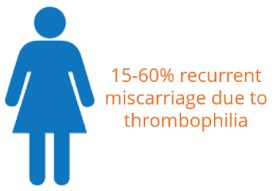
Thrombophilia gene screen
Throughout an entire normal pregnancy, the mother’s ability to produce blood clots in the uterus
and the placenta is suppressed. Non-clotting blood freely flows to and nourishes the baby.
Some mothers may have certain conditions that increased tendency for the blood to clot is
called thrombophilia. The resulting clots may cause the following complications to occur
* Implantation failure
* Miscarriages
* Pre-eclampsia
* Intrauterine growth retardation
* Oligohydramnios (low levels of amniotic fluid )
* Abruptio placenta
* Premature labor (often caused incompetent cervix syndrome )
* Unexplained intrauterine fetal death
* Thrombophlebitis (blood clots in the veins or the arteries during pregnancy )
Any woman experiencing any of these complications needs to be evaluated for
thrombophilia
Once diagnosed as acquired or inherited, thrombophilia can be treated and healthy, normally
grown babies can be born. The treatment for each is different
At ansary labs we introduce package designated to cover most common
causes of thrombophilia both inherited & acquired
* panel for Thrombophilia
Thrombophilia gene screen (Factor V Leiden mutation H1299R ,F7_10976 , F13 _G>T,
Fibrinogen ,ITGA2, ITGB3, MTHFR C677T and A1298C,MTR2756_A>G , MTRR66 _ A>G
mutations & Prothrombin Gene Mutation 20210 (GA) PAI-1 gene mutation )
*. Protein C & Protein S activities * Lupus anticoagulant antibody
* Anti cardiolipin IgM & IgG
* Beta-2 Glycoprotein( IgM & IgG ) * Anti-thrombin III * Homocysteine





































